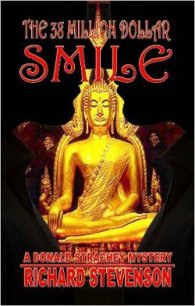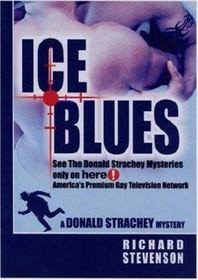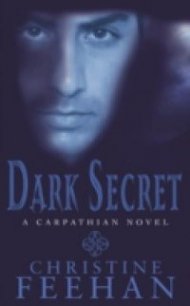Congo - Crichton Michael (читать книги полностью без сокращений бесплатно TXT) 📗
Nearly all language-skilled primates swore, and they employed a variety of words for swearing. Sometimes the pejorative seemed to be chosen at random, “nut” or “bird”
or “wash.” But at least eight primates in different laboratories had independently settled on the clenched-fist sign to signify extreme displeasure. The only reason this remarkable coincidence hadn’t been written up was that no investigator was willing to try and explain it. It seemed to prove that apes, like people, found bodily excretions suitable terms to express denigration and anger.
Peter shitty. she signed again.
“Amy…“ He doubled the Thoralen dose he was drawing into the syringe.
Peter shiny boat shiny people shiny.
“Amy, cut it out.” He stiffened his own body and hunched over, imitating a gorilla’s angry posture; that often made her back off, but this time it had no effect.
Peter no like Amy. Now she was sulking, turned away from him, signing to nobody.
“Don’t be ridiculous,” Elliot said, approaching her with the syringe held ready. “Peter like Amy.”
She backed away and would not let him come close to her. In the end he was forced to load the CO2 gun and shoot a dart into her chest. He had only done this three or four times in all their years together. She plucked out the dart with a sad expression. Peter no like Amy.
“Sorry,” Peter Elliot said, and ran forward to catch her as her eyes rolled back and she collapsed into his arms.
Amy lay on her back in the second boat at Elliot’s feet, breathing shallowly. Ahead, Elliot saw Munro standing in the first boat, leading the way as the Zodiacs slid silently downstream.
Munro had divided the expedition into two rafts of six each; Munro went in the first, and Elliot, Ross, and Amy went in the second, under Kahega’s command. As Munro put it, the second boat would “learn from our misfortunes.”
But for the first two hours on the Ragora, there were no misfortunes. It was an extraordinarily peaceful experience to sit in the front of the boat and watch the jungle on both sides of the river glide past them in timeless, hypnotic silence. It was idyllic, and very hot; Ross began to trail her hand over the side in the muddy water, until Kahega put a stop to it.
“Where there is water, there is always mambo,” he said. Kahega pointed to the muddy ‘banks, where crocodiles basked in the sunshine, indifferent to their approach. Occasionally one of the huge reptiles yawned, lifting jagged jaws into the air, but for the most part they seemed sluggish, hardly noticing the boats.
Elliot was secretly disappointed. He had grown up on the jungle movies where the crocodiles slithered menacingly into the water at the first approach of boats. “Aren’t they going to bother us?” he asked.
“Too hot,” Kahega said. “Mambo sleepy except at cool times, eat morning and night, not now. In daytime, Kikuyu say mambo have joined army, one-two-three-four.” And he laughed.
It took some explaining before it was clear that Kahega’s tribesmen had noticed that during the day the crocodiles did pushups, periodically lifting their heavy bodies off the ground on their stubby legs in a movement that reminded Kahega of army calisthenics.
“What is Munro so worried about?” Elliot asked. “The crocodiles?”
“No,” Kahega said.
“The Ragora Gorge?”
“No,” Kahega said.
“Then what?”
“After the gorge,” Kahega said.
Now the Ragora twisted, and they came around a bend, and they heard the growing roar of the water. Elliot felt the boat gathering speed, the water rippling along the rubber gunwales. Kahega shouted, “Hold fast, Doctors!”
And they were into the gorge.
Afterward, Elliot had only fragmented, kaleidoscopic impressions: the churning muddy water that boiled white in the sunlight; the erratic wrenching of his own boat, and the way Munro’s boat up ahead seemed to reel and upend, yet miraculously remain upright.
They were moving so fast it was hard to focus on the passing blur of craggy red canyon walls, bare rock except for sparse green clinging scrub; the hot humid air and the shockingly cold muddy water that smashed over them, drenching them time and again; the pure white surge of water boiling around the black protruding rocks, like the bald heads of drowned men.
Everything was happening too fast.
Ahead, Munro’s boat was often lost from sight for minutes at a time, concealed by giant standing waves of leaping, roaring muddy water. The roar echoed off the rock walls, reverberating, becoming a constant feature of their world; in the depths of the gorge, where the afternoon sun did not reach the narrow strip of dark water, the boats moved through a rushing, churning inferno, careening off rocky walls, spinning end around end, while the boatmen shouted and cursed and fended off the rock walls with paddles.
Amy lay on her back, lashed to the side of the boat, and Elliot was in constant fear that she would drown from the muddy waves that crashed over the gunwales. Not that Ross was doing much better; she kept repeating “Oh my God oh my God oh my God” over and over, in a low monotone, as the water smashed down on them in successive waves, soaking them to the skin.
Other indignities were forced upon them by nature. Even in the boiling, pounding heart of the gorge, black clouds of mosquitoes hung in the air, stinging them again and again. Somehow it did not seem possible that there could be mosquitoes in the midst of the roaring chaos of the Ragora Gorge, but they were there. The boats moved with gut-wrenching fury through the standing waves, and in the growing darkness the passengers baled out the boats and slapped at the mosquitoes with equal intensity.
And then suddenly the river broadened, the muddy water slowed, and the walls of the canyon moved apart. The river became peaceful again. Elliot slumped back in the boat, exhausted, feeling the fading sun on his face and the water moving beneath the inflated rubber of the boat.
“We made it,” he said.
“So far,” Kahega said. “But we Kikuyu say no one escapes from life alive. No relaxing now, Doctors!”
“Somehow,” Ross said wearily, “I believe him.”
They drifted gently downstream for another hour, and the rock walls receded farther away on each side, until finally they were in fiat African rain forest once more. It was as if the Ragora Gorge had never existed; the river was wide and sluggish gold in the descending sun.
Elliot stripped off his soaking shirt and changed it for a pullover, for the evening air was chilly. Amy snored at his feet, covered with a towel so she would not get too cold. Ross checked her transmitting equipment, making sure it was all right. When she was finished, the sun had set and it was rapidly growing dart. Kahega broke out a shotgun and inserted yellow stubby shells.
“What’s that for?” Elliot said.
“Kiboko, “Kahega said. “I do not know the word in English.” He shouted, “Mzee! Nini maana kiboko?"
In the lead boat, Munro glanced back. “Hippopotamus,” he said.
“Hippo,” Kahega said.
“Are they dangerous?” Elliot asked.
“At night, we hope no,” Kahega said. “But me, I think yes."
The twentieth century had been a period of intensive wildlife study, which overturned many tong-standing conceptions about animals. It was now recognized that the gentle, soft-eyed deer actually lived in a ruthless, nasty society, while the supposedly vicious wolf was devoted to family and offspring in exemplary fashion. And the African lion-the proud king of beasts-was relegated to the status of slinking scavenger, while the loathed hyena assumed new dignity. (For decades, observers had come upon a dawn kill to find lions feeding on the carcass, while the scavenging hyenas circled at the periphery, awaiting their chance. Only after scientists began night tracking the animals did a new interpretation emerge: hyenas actually made the kill, only to be driven off by opportunistic and lazy lions; hence the traditional dawn scene. This coincided with the discovery that lions were in many ways erratic and mean, while the hyenas had a finely developed social structure-yet another instance of longstanding human prejudice toward the natural world of animals.)


![[Magazine 1968-012] - The Million Monsters Affair - Davis Robert Hart (читать книги TXT) 📗](/uploads/posts/books/56864/56864.jpg)

